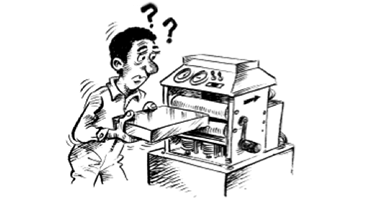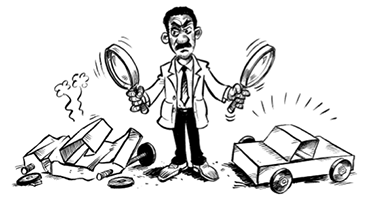THE CONTINUOUS IMPROVEMENT SIMULATION (CIS) PUTS PARTICIPANTS IN AN IMMERSIVE AND COMPETITIVE ENVIRONMENT THAT GIVES THEM FRONT ROW SEATS TO THE STRESSES AND COMPLEXITIES OF RUNNING AND OPERATING A BUSINESS AND PROFITABILITY INFLUENCERS.
CIS focuses competing teams on the following key drivers of profitability: Quality (with price being an element of quality), Volume (increasing) or Cost (decreasing). Teams make high-level strategy decisions on their main business focus QUALITY, VOLUME OR COST. Based on how their team is able to perform and deliver business results, they evaluate their performance against these indicators - Staff, Time, Resources, Information, and Processes (STRIP). and continuously improve through analysis and modification.
THE SIMULATION PROCESS
As employees of a car manufacturing division, teams are challenged with achieving targets set by management. Competing teams, fight to ensure they are not the least profitable division, which will be forced to close down.

The Planning of Efficient Production
Participants will see and experience the result and repercussions of planning and efficiency.

The Application of Limited Resources
Participants will learn how to apply both human and capital resources in order to accomplish business goals.

The Concept of Benchmarking
Participants will learn the proper measurement of performance and how performance affects a business.

An Understanding of Causality
Participants experience the relationship between decisions made, and outcomes realized.
No One Gets to Hide in a Team Business Workshop
When participants are under pressure to perform and make good business decisions, they are very energized and have a great deal of fun in the process. This making the learning experience that much more memorable and therefore, that much more valuable to the individuals and your company.
SIMULATION KEY LEARNINGS
Participants gain an understanding of how to identify opportunities for improvement within the business with a direct impact on profitability. They gain a dramatic appreciation for the relationship between quality, volume, and cost inside a classic business operational structure.
- Business drivers: quality, volume and cost
- How changing these drivers affects profitability
- Benchmarking
- Understanding of critical business drivers: staff, time, resources, information and processes and the how-to manage constraints
- How these drivers can be used to identify shortcomings and opportunities for improvement within a business
APPLICATION BACK TO THE BUSINESS
Having completed the simulation, participants are able to translate the learning to the challenges faced by your business. They will have a keen ability to identify and define shortcoming and opportunities within the business.
Staff will be able to:
- Pinpoint which key business drivers, if focused upon, is likely to produce the greatest increase in profitability
- identify which inputs they are to acquire more of, or use better, that will produce the most value in pursuit of improvement objectives regarding Quality, Volume or Cost
- Better understand the impact that input behaviour and performance have on the bottom-line
PROGRAM SIZE
Teams typically have 7-10 members each, and a workshop can be up to 120 people. Participants of all disciplines can participate. The program can be run in 4 hours in a single session.